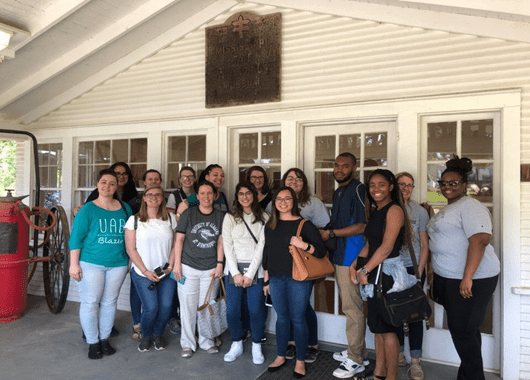Boswell Regional Center – Then
Today, we traveled back into the early twentieth century, and learned about a man who believed that all people deserve access to healthcare regardless of race, status, or age. We first learned about Dr. Henry Boswell from Gloria Beckett, MPH, a Branch Director II with the Office of Tuberculosis and Refugee Health at the Mississippi State Health Department (MSDH). Dr. Boswell worked tirelessly on providing a holistic approach to treating all people that were diagnosed with tuberculosis. Dr. Boswell, an Alabama native, moved to Mississippi in the early 1900’s where he practiced medicine. Shortly after his move, he contracted tuberculosis. He was treated in El Paso, Texas at a local sanatorium where he was inspired to design a tuberculosis sanatorium to serve Mississippians with the disease. So when he returned to Mississippi in 1916, he went before the state legislature to obtain initial funding for the sanatorium – $8,000. The city of Magee, MS, generously donated 200 acres of land to the cause. A later allocation of $25,000 by the Mississippi legislature allowed further expansions at the site. Dr. Boswell saw his vision come to life as his sanatorium prevented and suppressed the disease by providing a relaxing green space with healthy foods. This facility encompassed a healthy living environment that included a patient residence area, infirmaries, power plants, laundry, a post office and a nurse dormitory. It was a self-sufficient community (at one time named Sanatorium, MS) with a dairy farm and gardens on site. We had the pleasure of touring the sanatorium grounds, guided by Kara Kimbrough, Public Relations at Boswell Regional Center (BRC), were we were able to visit the Mississippi State Sanatorium Museum and tour some of the original buildings that still remain from the early years of the sanatorium.
Because of the innovations of not only Dr. Boswell but the many other physicians and staff that worked at the site, Mississippi saw healthier outcomes for its communities. Reductions in TB diagnoses were seen across Mississippi in the mid-twentieth Century. These reductions were partly due to the work of those at Boswell, and partly because of the implementation of portable treatment units by the department of health that would go out into the communities to find those with TB. The advent of antibiotic treatments made even greater strides in controlling the disease. Even though the sanatorium closed its doors in the 1970s, tuberculosis continues to be a relevant concern in Mississippi. Today’s concerns are multifold and linked to the social determinants of health. Antibiotic resistance is a growing global concern. The MSDH cited a few reasons for this phenomenon including lack of patient compliance, lack of medication adherence, and improper medication dosage. The MSDH also has fewer and fewer resources to devote to the issue. Every year their budgets are reduced even though they are overspending the TB budget by millions of dollars to conduct testing and reach those with TB across the state. Due to lack of resources, the fight towards managing tuberculosis still remains a challenge in the state of Mississippi.
What really surprised us during this visit was that in the 1930’s as part of the mission of the TB Sanatorium, a Preventorium was established in the name of a preventative program for TB in children. What actually was happening during this time of the Great Depression is that children were being dropped off at the gates of the TB Sanatorium because parents could no longer afford to feed their children. The staff at the time knew that this was the right thing to do, and did not turn these children away. Ms. Kimbrough shared that some of these children returned as adults to tour the site and share their stories and experiences with those at the BRC.
Boswell Regional Center – Now
When the TB sanatorium closed in the 1970s, the Mississippi Department of Mental Health acquired the facility and transformed it to the Boswell Regional Center that provides a continuum of care and services for individuals with intellectual and developmental disabilities (IDD). When the center was established, the primary focus was to provide permanent housing services and care for up to 35 people with IDD. Today more than 100 individuals live on campus at the BRC and another 300 individuals who live in the community with varying degrees of assistance and services (i.e. transportation, companion care, community support, living assistance, worker training, enrichment services, job services, etc.) from the BRC. If one were to visit the BRC, one would see the dedication and sense of community that permeates. You can really see how staff are working to help each individual live a more independent and fulfilling life in whatever community they reside.
Mental health stigma continues to be a growing public health issue throughout the United States. The BRC recognizes this and is working tirelessly to combat this in Mississippi. Boswell’s policy is to never reject a patient despite their ability to pay. Improving the quality of life for individuals living with IDD, their families, and their community is at the heart of the BRC’s work to”make dreams a reality one person at a time.”




